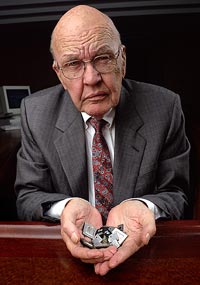Jack Kilby facts for kids
Quick facts for kids
Jack Kilby
|
|
|---|---|
 |
|
| Born | November 8, 1923 Jefferson City, Missouri, U.S.
|
| Died | June 20, 2005 (aged 81) Dallas, Texas, U.S.
|
| Nationality | American |
| Alma mater | University of Illinois at Urbana–Champaign University of Wisconsin–Milwaukee |
| Awards | Nobel Prize in Physics (2000) National Medal of Science (1969) IEEE Medal of Honor (1986) Charles Stark Draper Prize (1989) Computer Pioneer Award (1993) Kyoto Prize (1993) Harold Pender Award (2000) |
| Scientific career | |
| Fields | Physics, electrical engineering |
| Institutions | Texas Instruments |
Jack St. Clair Kilby (born November 8, 1923 – died June 20, 2005) was an American electrical engineer. He helped create the very first integrated circuit (also known as a microchip). This happened in 1958 while he worked at Texas Instruments.
Kilby shared the Nobel Prize in Physics in 2000 for this amazing invention. He also helped invent the handheld calculator and the thermal printer. These inventions changed how we use electronics every day.
Contents
Early Life and Education
Jack Kilby was born in 1923 in Jefferson City, Missouri. His parents, Hubert and Vina Kilby, both had science degrees. His father worked as a manager at a local power company. Jack grew up and went to school in Great Bend, Kansas. Today, road signs in the town remember his time there.
Kilby studied at the University of Illinois at Urbana–Champaign. He earned his Bachelor of Science degree in electrical engineering in 1947. Later, in 1950, he received his Master of Science degree from the University of Wisconsin–Milwaukee. He completed this while working at a company called Centralab.
Inventing the Microchip
In the middle of 1958, Jack Kilby was a new engineer at Texas Instruments (TI). He worked through the summer on a big problem in electronics. This problem was about how to make circuits smaller and more efficient. He realized that if all the parts of a circuit could be made on one tiny piece of semiconductor material, it would solve the problem.
On September 12, 1958, Kilby showed his idea to the company's leaders. He used a small piece of germanium connected to an oscilloscope. When he flipped a switch, the oscilloscope showed a steady wave. This proved that his tiny circuit worked! This was the first working integrated circuit.
Kilby and Robert Noyce are both given credit for inventing the integrated circuit. Noyce independently created a similar circuit a few months later. Kilby's invention was officially patented as "Miniaturized Electronic Circuits" in 1959.
Impact and Other Inventions
Jack Kilby continued to work on microchip technology. He led teams that developed the first military system and the first computer using integrated circuits. These tiny chips made it possible to build much smaller and more powerful electronic devices.
He also helped invent the handheld calculator with Jerry Merryman and James Van Tassel. This invention put computing power into everyone's hands. Kilby was also behind the thermal printer, which was used in early portable data devices.
In 1970, Kilby took a break from Texas Instruments to work as an independent inventor. He explored new ideas, including how to use silicon to create electricity from sunlight. From 1978 to 1984, he taught electrical engineering at Texas A&M University. He retired from Texas Instruments in 1983.
Legacy and Recognition
Jack Kilby passed away on June 20, 2005, at the age of 81 in Dallas, Texas. His work changed the world forever.
After his death, his family donated his personal papers and photos to Southern Methodist University (SMU). In 2008, SMU celebrated the 50th anniversary of the integrated circuit. They recognized Kilby's invention as the start of the digital age.
A statue of Jack Kilby stands at The University of Texas at Dallas. The Kilby Labs, which are research labs at Texas Instruments, are named after him. Also, the Jack Kilby Computer Centre at Edinburgh Napier University in Scotland is named in his honor.
Major Awards and Honors
Jack Kilby received many important awards for his work:
- Nobel Prize in Physics (2000): This was for his breakthrough invention of the integrated circuit.
- National Medal of Science (1969): This is one of America's highest honors for scientists.
- National Medal of Technology (1990): Another top award for engineering achievements.
- IEEE Medal of Honor (1986): A prestigious award from the Institute of Electrical and Electronics Engineers.
- National Inventors Hall of Fame (1982): He was recognized for his important inventions.
- Kyoto Prize (1993): An international award for significant contributions to science and technology.
Kilby also received nine honorary doctorate degrees from various universities.
Images for kids
See also
 In Spanish: Jack S. Kilby para niños
In Spanish: Jack S. Kilby para niños
- Geoffrey Dummer, the British engineer who first thought of the integrated circuit idea.


